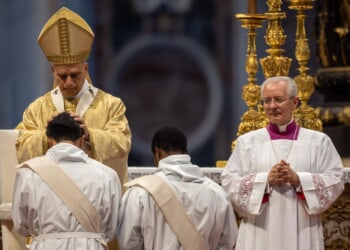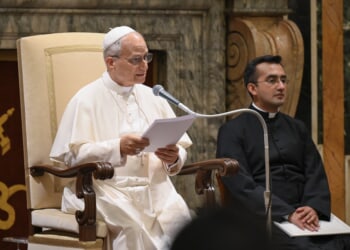CNA Newsroom, Jul 4, 2025 /
15:29 pm
Bishop Robert Barron on July 4 urged a federal court to strike down a Washington state law that would force priests to violate the seal of confession, telling the court that the law is “manifestly” disrespectful of the ancient and vital Church practice.
Barron, the bishop of Winona-Rochester and a member of the White House Religious Liberty Commission, made the argument in a proposed amicus brief filed in U.S. district court in Washington State.
The filing comes on behalf of the bishops of Washington State, who in May of this year sued the state government over its new mandatory reporting law that requires priests to report child abuse learned during the sacrament of confession or face jail time and fines.
The law has drawn criticism from religious liberty advocates who say it unjustly targets Catholics. The Department of Justice and a coalition of Orthodox churches have also sued the state government over the rule.
The Confraternity of Catholic Clergy, representing over 500 Roman Catholic priests and deacons from the U.S., Australia, and the United Kingdom, last month issued a statement defending the inviolability of the seal of confession, arguing against laws like Washington State’s and pointing out that child protection “can be lawfully and morally done without violating religious liberty.”
Barron’s brief stressed to the court what it described as the “oft-misunderstood theological underpinnings of the seal of Confession.”
“Few religious practices are more misunderstood than the sacred seal of Confession in the Catholic Church,” the bishop wrote in the document.
Since Catholics believe that penitents who seek the sacrament of confession are “speaking to and hearing from the Lord himself” via the priest, then “absolutely nothing ought to stand in the way of a sinner who seeks this font of grace,” Barron wrote.
“If a penitent is aware the priest might (let alone must) share with others what was given in the most sacred confidence, he or she would be reluctant indeed to ever approach Confession,” he said.
The bishop argued that the state law is “manifestly premised on a disrespect for the confessional seal,” in part because it explicitly exempts clergy from an otherwise-broad exception for privileged communications.
The law violates longstanding precedent on religious freedom, the bishop wrote, as well as established legal rules regarding religious neutrality.
Barron urged the court to grant an injunction against the law barring it from being enforced. The law is scheduled to take effect July 27.
A hearing for the lawsuit is scheduled for July 14.


















